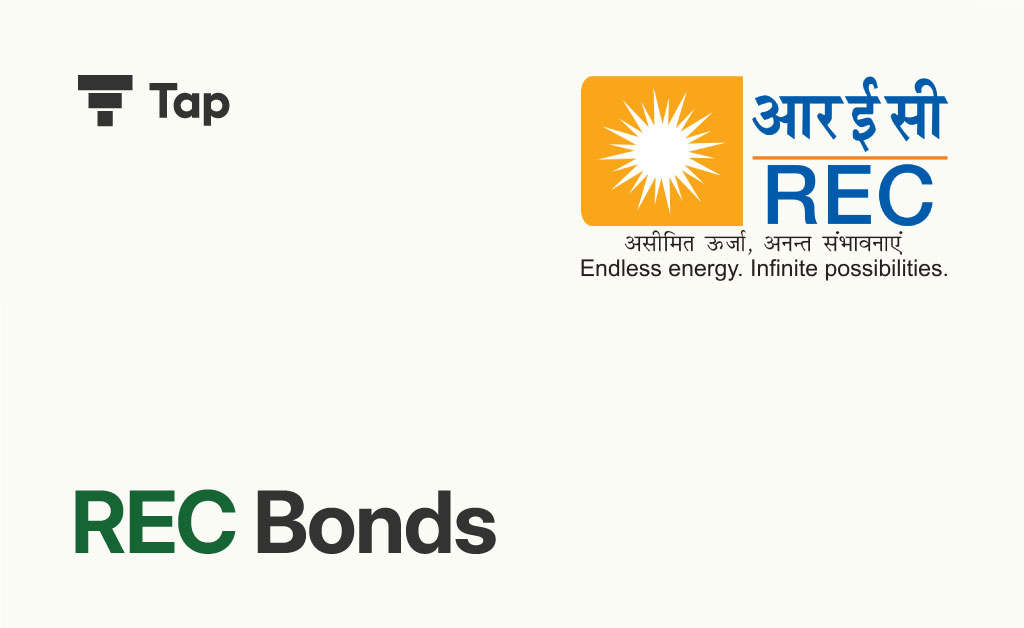Secure 5.25% Annual Returns with REC Bonds: Tax Benefits & Investment Guide

What Are REC Bonds?
REC Bonds are debt instruments issued by the Rural Electrification Corporation (REC) Limited, a public sector enterprise under the Ministry of Power, Government of India. These bonds are specially introduced to raise funds for rural electrification projects across India, contributing to the nation’s infrastructure development.
Features of REC Bonds:
- Issuer: Rural Electrification Corporation Limited
- Purpose: Financing rural electrification projects
- Type: Non-convertible bonds
- Maturity: Typically, REC bonds have a maturity period of 3 to 5 years
REC Bonds Interest Rate:
One of the primary attractions of REC Bonds is their competitive interest rates. The interest rate on REC Bonds varies depending on the market conditions and the specific bond issue. Historically, these rates have been competitive with other government-backed securities, offering a safe and reliable return on investment.
REC Capital Gain Bonds:
REC Capital Gain Bonds help investors save on capital gains tax. You are taxable when you sell a long-term capital asset, such as property or shares. However, you can defer or even avoid paying this tax by investing the gains in REC Capital Gain Bonds.
REC 54EC Bonds:
Under Section 54EC of the Income Tax Act, investing in REC Bonds can provide tax exemptions on long-term capital gains. Here are the critical points about REC 54EC Bonds:
- Eligibility: Any long-term capital asset gains can be invested in REC 54EC Bonds to claim tax exemption.
- Investment Limit: The maximum investment limit in these bonds is Rs—50 lakh in a financial year.
- Lock-in Period: The lock-in period for these bonds is five years.
- Tax Benefits: The invested amount is exempted from capital gains tax, provided the bonds are held for the specified period.
How to Invest in REC Bonds
Investing in REC Bonds is a straightforward process. Here are the steps:
- Eligibility Check: Ensure you can invest in these bonds, especially if you seek capital gains tax exemption under Section 54EC.
- Application Form: Obtain the application form from authorised banks or financial institutions.
- Please fill and Submit: Fill out the form with the necessary details and submit it along with the required documents and payment.
- Allotment: Once your application is processed, you will receive the bond certificate or a holding statement if you opt for a demat account.
Benefits of Investing in REC Bonds:
- Tax Savings: Significant tax savings under Section 54EC.
- Stable Returns: Attractive and stable interest rates.
- Safety: With the backing of the Government of India, it ensures low default risk.
- Contribution to Nation Building: Funds raised are used for rural electrification projects, contributing to national infrastructure development.
Risks Associated with REC Bonds:
While REC Bonds are generally considered safe, there are a few risks to be aware of:
- Interest Rate Risk: Bond prices may fluctuate with changes in interest rates.
- Liquidity Risk: These bonds have a lock-in period, which may limit liquidity.
- Credit Risk: Although minimal, there is always a risk of the issuer defaulting.
Frequently Asked Questions (FAQs):
- What is the current interest rate on REC Bonds?
- REC Bonds offer an annual interest rate of 5.25% as of April 1, 2023, with interest payments made every year on June 30 until redemption. The remaining interest, if any, will be paid along with the redemption amount. Investors must invest ₹10,000 at least, equivalent to purchasing at least one bond.
- How much can I invest in REC 54EC Bonds?
- The maximum investment limit for REC 54EC Bonds is Rs—50 lakh in a financial year.
- What is the lock-in period for REC 54EC Bonds?
- The lock-in period for REC 54EC Bonds is five years.
- Are REC Bonds safe to invest in?
- Yes, REC Bonds are considered safe as the Rural Electrification Corporation, a government-backed entity, issues them.
- Can NRIs invest in REC Bonds?
- Yes, Non-Resident Indians (NRIs) are allowed to invest in REC Bonds, subject to compliance with the regulations of the Reserve Bank of India.
Conclusion:
REC Bonds offer a unique combination of stable returns, tax benefits, and a contribution to national development. With attractive interest rates and significant tax advantages under Section 54EC, these bonds are an excellent investment option for those looking to save on capital gains tax and earn a steady income. Before investing, always stay updated on the latest interest rates and terms.
Are you interested in investing in bonds? If yes, Tap Invest is the best investment platform as we offer various types of bonds, such as AAA and senior secured bonds. Just sign up now and start investing in bonds to diversify your portfolio.
